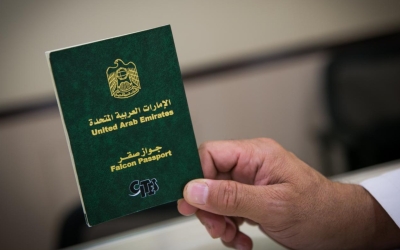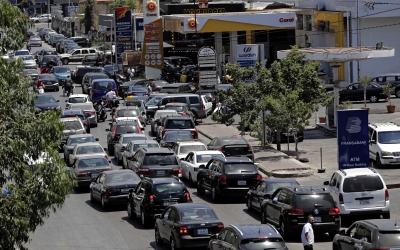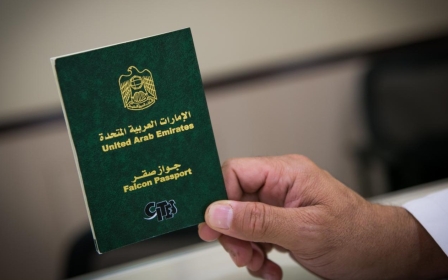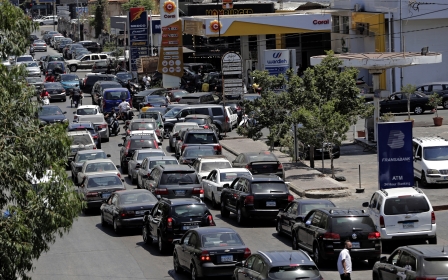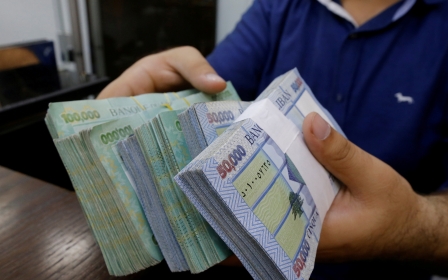Lebanon crisis: Citizens desperate to escape decry passport application chaos
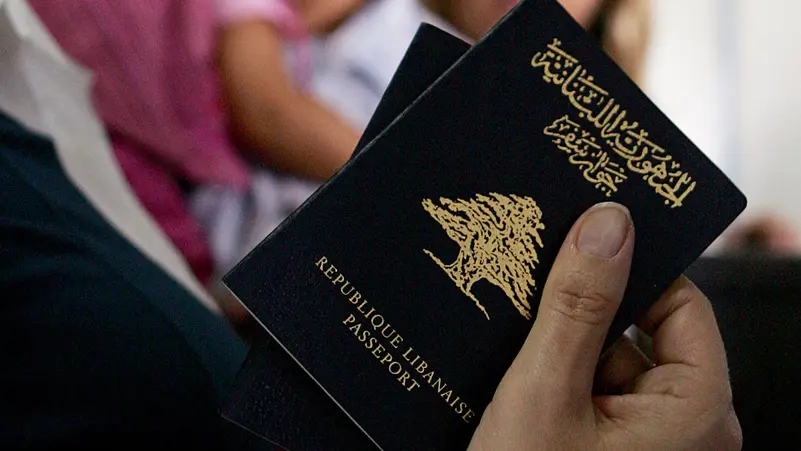
On his computer, Ali Mansour desperately searches for the earliest date for a passport appointment. The 30-year-old engineer scrolls and scrolls for a date he can click on to book.
October, fully booked, September, fully booked... Finally he finds an available appointment - on 20 December 2023.
“My ticket out of this country, if found, cannot be cashed in until the end of next year,” he says.
Like many of his peers trying to escape the ongoing financial collapse Lebanon has experienced since October 2019, Mansour has been introduced to a new concept the Lebanese never imagined they would experience - “country arrest”.
“Before, it might have been difficult to secure the necessary visa, the desired opportunity, the career abroad you aspired to," Mansour tells Middle East Eye. "Now, if you were lucky enough to overcome all of this, you will still be one step short, without the ability to obtain a passport.”
New MEE newsletter: Jerusalem Dispatch
Sign up to get the latest insights and analysis on Israel-Palestine, alongside Turkey Unpacked and other MEE newsletters
Mansour explains that he had been able to secure a study visa in Spain, but pursuing his studies are not his main objective.
“I just want to leave this place in any way possible," he says. "When I get there, I will find a way to survive and hopefully be able to send my parents money. They are in desperate need now to secure the basic necessities.”
In April, Lebanon's General Security department declared that due to the suspension of the funds needed to print new passports it was obliged to freeze the application process until new funds became available. The unavailability of passports has left many Lebanese, both in Lebanon and abroad, unable to move.
Rights violated
Josiane Noun, from the Lebanese Centre for Human Rights, sees the inability to obtain a passport as a violation of both human rights and the Lebanese constitution.
The universal declaration of human rights clearly states in its 13th article that any individual has the right to leave any country, including their own, and the right to come back.
“Any Lebanese is protected by this right, which has been violated under numerous pretexts," Noun told MEE.
"The authorities juggle the blame and the responsibility, but the outcome is the same.
"There is a daily violation of basic human rights. No one should even explain why he or she needs the passport, or beg to obtain what is rightfully theirs, especially if they are willing to pay for it.”
Funds to reactivate Lebanon's passport process were finally secured after several weeks of delay by the ministry of finance, and on 13 June the application platform was reopened.
A source within the General Security department told MEE: “The allocated funds were wired to the French company in charge of printing the passports, who will start printing 400,000 passports from November. While we expect that the crisis will soon come to an end, we can’t control the large numbers of already registered applicants.”
'Out of this hell'
According to Information International, an independent regional research and consultancy firm based in Beirut, emigration from Lebanon rose by 346 percent in 2021, due to the economic crisis.
Mohammad Chamseddine, a researcher at the consultancy, told MEE: “Some 79,000 Lebanese have left the country without the intention of going back, compared with 17,000 in 2020.
'We expect that the 2022 numbers will be much higher, as the economic crisis keeps on getting worse'
– Mohammad Chamseddine, researcher
"While 2021 marks the highest wave of emigration from the country in four years, we expect that the 2022 numbers will be much higher, as the economic crisis keeps on getting worse.”
Bilal, who has been unemployed for the past two years and agreed to speak on condition of anonymity, told MEE he did not have the luxury to wait.
“Before the crisis I was able to manage my expenses with the help of my parents. Today, after the crisis, my parents need financial support, after wages were crushed due to the devaluation of the currency. Before, it was not worth finding a job with a mediocre salary. Today I have no choice, I have to leave to support them at all costs.”
Bilal told MEE that he was offered an administrative job in a Gulf country on the condition of starting the role in less than a month, an impossible deadline with the current passport crisis.
“I had to pay $1,000 to get an early appointment; now I am just waiting for the visa and I will be out of this hell," he said.
'A life in between queues'
Riman, not her real name, is a mother of two daughters, who both have Canadian citizenship. The past two years have been very difficult, after her husband died of Covid. Amid the ongoing financial collapse, Riman has found it tremendously difficult to make ends meet for her and her two girls.
“I have had a Canadian Green Card for almost 10 years and never thought about filing for citizenship," she told MEE, not wishing to give her real name in case it affected her passport application.
"We were doing OK, but then everything collapsed; my husband passed away, our life savings are stuck in the banks.
"Taking my daughters back to Canada seems to be the only choice left, but I need to get my passport renewed first and my appointment or my Green Card will expire.”
Passing by the General Security building, a long queue appears, both of people waiting for their scheduled appointments and the lucky ones waiting to pick up their passports after being able to file for one. The queue resembles those that keep forming in front of bakeries and petrol stations due to the constant shortages facing Lebanon.
Mohamad, who did not wish to give his surname, is queuing for his passport after waiting for six months. As he waits his turn, he tells MEE he is leaving for Canada with his family, after receiving immigration clearance.
“Yesterday I was in the bakery queue, today I am waiting in the passport queue. Our life has become a life in between queues," he says. "When I get this passport, I will never look back. After so many queues, the only queue I would appreciate will be of people paying respect to my dead body after I depart from this Earth - if I successfully depart from this country first.”
This article is available in French on Middle East Eye French edition.
Middle East Eye delivers independent and unrivalled coverage and analysis of the Middle East, North Africa and beyond. To learn more about republishing this content and the associated fees, please fill out this form. More about MEE can be found here.


